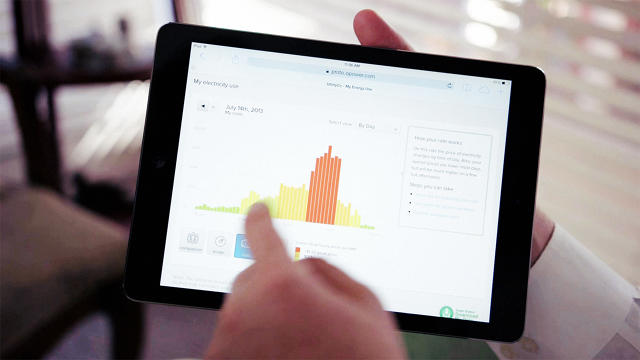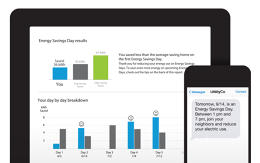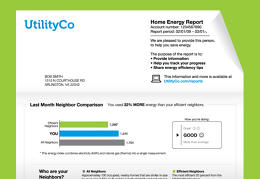Keeping Down With The Joneses: How You’re Being Manipulated To Save The Environment
The World Wildlife Fund urges us to think about the poor polar bears and penguins whose homes are swiftly melting away. Meanwhile, documentaries—from Al Gore’s classic An Inconvenient Truth to Showtime’s recent Years of Living Dangerously—warn us of impending natural disasters. Yes, environmentalists tend to go all dramatic on us in order to minimize energy use and treat the planet better. But these efforts, largely, aren’t working. A spate of new evidence suggests that fear-based approaches to environmental change are backfiring, resulting in little more than angry arguments over Thanksgiving dinner between you and your climate-change-doubting uncle. But about a decade ago, behavioral psychologists hit on an important finding: people are actually willing to save energy when they see how much energy their neighbors are using. A groundbreaking 2004 study revealed that, contrary to popular belief, people do not care much about saving money on their electricity bill or protecting the environment; the single biggest motivator to changing our energy consumption is our desire to keep up—or, in this case, down—with the more energy-efficient Joneses. In 2007, Dan Yates and Alex Laskey, longtime friends who met at Harvard, decided to launch a startup based on this one powerful finding. The result is Opower, a software firm that partners with energy companies to provide homeowners with energy consumption reports that include details about the norms in their neighborhood. In what has been described as the biggest behavioral psychology experiment of all time, Opower’s business involves constantly tweaking reports to see exactly what information triggers people to use less energy. So far, Opower has analyzed over 300 billion meter readings to create these reports, which has abated nearly 9 billion pounds of carbon dioxide and 5.2 billion kilowatts of energy. And as an additional perk, Opower customers have collectively saved $580 million in energy bills.
By now, it is undeniable that real behavioral change happens when people understand how their energy consumption fits in with other people’s uses, but Opower wants to go further and understand why this is. Why do people care more about their neighbor’s behavior than they do about saving those soon-to-be homeless polar bears? One part of the puzzle, according to Julie O’Brien, a social psychologist at Opower, is that other sustainability efforts often do not account for the fact that humans are fundamentally social beings: we act not just out of a desire to be moral, but also to be normal. In other words, even as fully grown home-owning adults, we’re still prone to giving in to peer pressure. “Discovering that you are different from other people can result in a powerful emotional reaction,” O’Brien tells me. “We’re working to understand how we can capitalize on consumers’ motivations and attitudes to impact their behavior. We believe that these ideas are integral to lasting behavioral change.”
O’Brien and the many other psychologists Opower hires are still trying to figure out exactly why we care so much about other people’s behavior. There are many unanswered questions. For instance, when people see they are using more energy than others, do they change their behavior out of guilt? Are these reports simply new, intriguing bits of information that spur people to remember to switch off the lights and turn off the A.C.? Are people just downright competitive and always, blindly striving to be the best? “We haven’t landed on the right answer yet, but we’re doing experiments like you would see at a university social psychology lab,” O’Brien explains. “We show people their home energy report then measure several different attitudes. This allows us to predict their intentions and uncover some of the mechanisms behind this impact.” Opower wants to understand people’s motivations because changing people’s behavior is a tricky, complex business that, if done incorrectly, can have negative effects. For instance, O’Brien points to a well known experiment in which researchers tried to curb college drinking by sharing the information that 40% of college freshmen end up with alcohol poisoning; but this only provoked freshmen to drink more because they figured everyone else was doing it. It’s all about context. “Providing information about the norm can result in more bad behavior,” says O’Brien. “You need to think carefully about what the driving mechanisms are behind a tool and how it needs to be adapted in a particular context.”

Consumers, for their part, are not particularly alarmed that their behavior is being tracked and manipulated. So many companies already spy on consumers to get us to buy more products that using these tools to help us save the environment seems downright noble. O’Brien tells me that people are often eager to change their behavior for the better, but don’t know how to begin. Opower receives a lot of positive feedback from customers who are grateful for the valuable new information in their home energy report. In Opower focus groups, participants often describe feeling overwhelmed because the whole concept of energy seems so abstract. Having tangible details about how their energy use measures up with their neighbors gives them a tangible sense of what they can feasibly do to keep pace. “We’re giving people tools to help them act in ways they want to act,” O’Brien says. So does this same method of providing information about norms be used to make organizations more energy efficient too? While there hasn’t been the same research into corporate energy practices, experts note that companies care about how they rank compared to the rest of their industry. “There’s definitely an interest in being the best,” says Robert Craudereuff, president of Craudereuff and Associates, a firm that helps government and corporate organizations develop and implement green infrastructures. “We’re helping clients to address root problems, but we’re also putting them in a position to be citywide leaders.”

At a corporate level, energy consumption becomes much more complicated. While homeowners only need to make a limited number of decisions about things like the temperature and light fixtures of their home, companies need to think about a vast range of factors, including their building structures, their supply chains and complying with government regulations. Large companies are also far more energy intensive than the average homeowner, so energy costs become a bigger part of their decision-making. “All of this can feel complicated,” says Craudereuff. “Companies may want to do the right thing, but they don’t know how to hire the right person for the job or do a cost benefit analysis of potential savings.” George Twigg, director of public affairs at the Efficiency Vermont, an organization that helps individuals and companies to optimize their energy efficiency, says companies require technical assistance because saving energy can be bewildering. “A huge issue, even for large companies, is not having the in-house expertise because it is not their core business,” Twigg tells me. “But that said, an important motivating factor for companies is that they want to be seen by customers and the community as good stewards of resources.” Twigg says his Efficiency Vermont deliberately plays into companies’ desire to be the best by creating competition. “To galvanize our business customers to take action, we ran an energy leadership challenge in which Vermont’s largest electricity users could volunteer to try to reduce their energy use by 7.5%,” he says. “These competitions work because companies want to be seen as leaders.” In some ways, this strategy is not that different from Opower’s efforts to make energy savings a more social process for individuals; in fact, Efficiency Vermont is currently collaborating with Opower to bring home energy reports to homeowners in their state. “What we see with the Opower initiative that is similar to the work we do on the commercial side is that people don’t know how their energy use stacks up compared to others—most people and companies think they are about average, when they might actually be better or worse than average,” Twigg says.

There is no doubt that Opower’s reports have been highly effective at changing people’s energy consumption; the company is held up as a shining beacon of innovation and success by President Barack Obama and Prime Minister David Cameron. And while environmentalists around the world rejoice at Opower’s results, some are asking whether behavioral psychology techniques are enough to bring about long term change. “I agree with the behavioral science,” says Michael Quah, a sustainability expert and a professor at the National University of Singapore. “But I also think that rather than educating people to rise to their highest selves, we might be catering to their baser selves. It comes down to a philosophical question of whether behavior will change our values or whether values inform behavior.” Ultimately, Quah believes that the Opowers of the world have an important role to play, but that we should still be appealing to people’s altruism and continuing the conversation about the complex processes necessary to protect the environment. “We need to do what is pragmatic, but we also need to work on the complementary longer-term thinking about what is actually at stake here,” he says.
(342)














